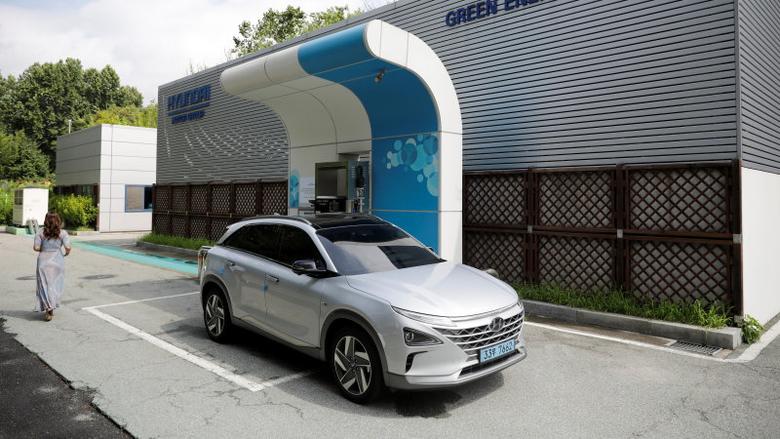
HYDROGEN FOR S.KOREA

PLATTS - 10 Jun 2020 - South Korea's ambitions to make hydrogen a part of its transport fuel mix is garnering support from its auto makers such as Hyundai Motor, as it looks to gain ground in a space that is being hotly pursued by other Asian countries.
Hyundai Motor, South Korea's leading auto maker, is looking to expand the fuel's scope by setting up infrastructure, a stepping stone in realizing the the government's hydrogen blueprint that was unveiled last year.
The country aims to sharply increase production of hydrogen-powered vehicles and electricity generation by hydrogen, in an effort to use hydrogen as a major energy source for transportation and power generation.
"While de-carbonization remains a major consideration, South Korea's core priority relating to hydrogen appears to be to establish technology leadership in fuel cell cars and large scale stationary fuel cells for power generation," Peter Godfrey, managing director for Asia Pacific at The Energy Institute, told S&P Global Platts.
"Current policy is geared towards building the necessary infrastructure for H2 production and distribution."
Last week, Hyundai Motor opened a charging station for hydrogen-powered commercial vehicles at its auto plant in Jeonju, south of Seoul. It was the country's first charging station for hydrogen-powered commercial vehicles and ninth hydrogen charging station overall, according to a company official who spoke on the condition of anonymity.
"Hyundai Motor will make more efforts to play the leading role in the hydrogen-based commercial vehicle market by developing and producing hydrogen buses and trucks, as well as hydrogen passenger cars," the company official said.
On May 28, Hyundai Motor started operating its eighth hydrogen charging station. The hydrogen charging station in Seoul has been built inside an LPG station run by the country's second-biggest oil refiner GS Caltex.
"We will continue to make efforts to supply hydrogen electric vehicles and expand infrastructure so that South Korea can develop into a true hydrogen society," the company official said.
Hyundai Motor also signed an agreement with the government in May to improve hydrogen trucks' driving performance and safety features so as to supply hydrogen fuel-cell electric trucks in 2023.
Domestic focus
Hyundai, which currently exports hydrogen trucks to Switzerland, plans to launch a localized version of the truck for the domestic market in 2021. Last month, Hyundai Motor also announced a plan to build charging facilities for hydrogen buses at Incheon International Airport by March 2021.
Air Liquide SA will supply high-end charging equipment and hydrogen to the facilities for the airport, according to the company official. In October 2018, Hyundai Motor had partnered with Air Liquide for hydrogen-powered vehicles and for the establishment of hydrogen charging stations.
The automaker has been betting on hydrogen fuel cell electric vehicle, or FCEV -- a rival technology to internal combustion engines -- and has decided to invest Won 7.6 trillion ($6.3 billion) along with its local partners by 2030 in order to produce 500,000 hydrogen-powered vehicles annually.
Under its "FCEV Vision 2030", Hyundai Motor will expand its production capacity for vehicles using fuel cells that run on hydrogen gas to 11,000 units by 2020, from 1,000 at the end of 2019.
"We aim to produce 40,000 hydrogen-powered passenger and commercial vehicles in 2022, and increase the capacity to 130,000 units by 2025 and to 500,000 units in 2030," the company official said.
Edgare Kerkwijk, board member of the Asia Pacific Hydrogen Association, said that the country's main focus now is in boosting the use of hydrogen in the transport sector.
"Hyundai is one of the main proponents of a hydrogen economy. The company has been actively developing fuel cell based passenger and commercial vehicles," Kerkwijk told Platts.
Incentives and subsidies
The South Korean government under a "hydrogen society road map" has promised to offer broad subsidies and other incentives for hydrogen-powered cars.
The government aims to increase the number of hydrogen charging stations to 310 by 2022 from the current 37 across the country, while offering other incentives for infrastructure and technologies for hydrogen cars.
Accumulated sales of hydrogen fuel cell cars in South Korea reached 5,083 in 2019, jumping from only 87 in 2016, according to government data. Outbound shipments of the models reached 788 units last year.
The government has also decided to ease regulations on hydrogen fuel stations, while providing more hydrogen fuel cell buses and taxis, according to the Ministry of Trade, Industry and Energy.
"The COVID-19 pandemic has sparked the world's awareness over health and safety. Demand for environment-friendly hydrogen fuel cell cars will grow down the road," MOTIE Minister Sung Yoon-mo said in a recent meeting with Hyundai Motor and the Korea Automotive Technology Institute.
In May, South Korea unveiled plans to build the world's largest liquid hydrogen plant -- South Korea's chemical-focused conglomerate Hyosung Group signed a deal with Linde for a Won 300 billion ($244 million) project to build the plant by 2022 and having a capacity of 13,000 mt/year.
-----
Earlier:

2020, March, 24, 14:15:00
S.KOREA'S RESCUE PACKAGE $80 BLN
South Korea on Tuesday doubled a planned economic rescue package to 100 trillion won ($80 billion) to save companies hit by the coronavirus and put a floor under crashing stocks and bond markets.
|

2020, March, 4, 09:25:00
S.KOREA COAL POWER DOWN
The Ministry of Trade, Industry and Energy said in a statement that 21 to 28 coal-fired power plants would be closed from March 1 to March 31 in an effort to reduce emissions of fine dust.
|

2020, January, 27, 14:35:00
S.KOREA'S NUCLEAR PROBLEMS
However, the companies are giving up on their component supply business in order to survive and South Korea’s nuclear power industry is now on the verge of collapse.
|












